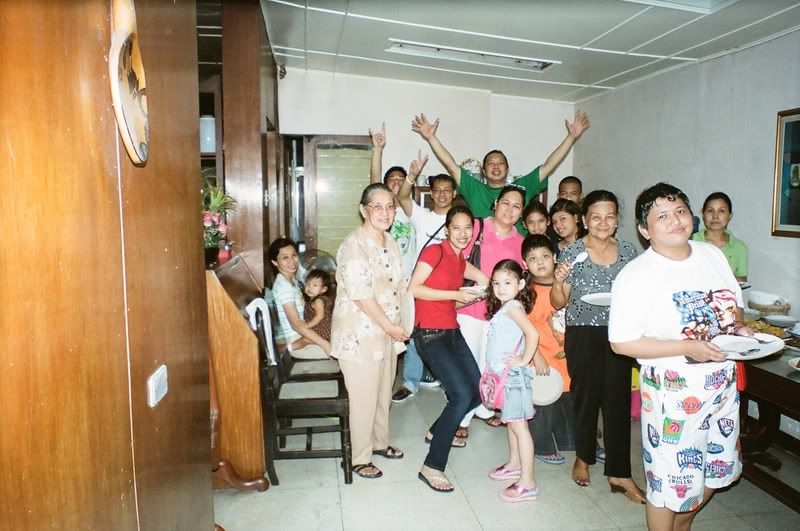
2. Filipinos still manage to pray together as a family either in the church or at home.
.jpg)
3. Filipino elders are still highly respected by their family especially by the young members of the family. The children still pay their respects by greeting their elders. Filipinos use the words "po" at "opo" to give respect to them.

4. Filipino families always eat a full meal during breakfast lunch and dinner. A meal is never complete with out rice and a drink like coke or water.

5. Filipino families also love traveling together, whether out of the country of abroad. When traveling, the family always make sure that they bring at least a bag or a basket of junk food or easy to open cans of food for the long journey.

6. Filipino families always bring "pasalubongs" for their friends and relatives back home when ever they travel abroad. Most of the times they love to bring home foods from other countries.

7. The Elemental Filipino Family
From cradle to grave, the family is the Filipino's rock of ages. In childhood and youth, it is his rock of support and security; in adulthood, it is home when he marries too early and cannot cope, an insurance for times of need; and then in old age, it is the hearth to which he returns, however far he may wander.
The Filipino may contract other bonds in the course of his life with the company he works for, the church he worships in, the neighborhood he lives in, even the foster nation he swears allegiance to - but the foundation of his strivings is first and foremost his family. And by family is meant the veritable tree that includes under its shade relations up to the third degree as well as in-laws. This explains why the Filipino orphan who does not know his genes is the most popular figure of pity in Filipino soap operas.
If there is one institution that truly works in the Philippines, it is probably the Filipino family. Not even the Roman Catholic Church or the State, for all their power and influence, can rival it in claiming the loyalty and allegiance of Filipinos.
There are three basic family systems the nuclear family which consists of a husband, wife and children; the polygamous family which consists of a husband or wife and several spouses and their children; and the extended family which brings together several generations in direct line and kinship ties built by marriage. The extended type best describes the Filipino family.

8. Filipino families love spending time together. They also love big gatherings such as fiestas, reunions and such where they can gather with all their other relatives and reconnect with each other.

9. Even though Filipino families love to travel they always seem to even love going home, back to their friends and relatives. They enjoy living life together in one house.

10. Unlike in Western countries, Filipino families don't put their elders in home for the ages. Instead, they go stay in their own homes. Sometimes, even staying with own kids.

11. Filipino families who lives abroad still brings their own culture with them abroad. In every Filipino household abroad, you can still see how they decorate their houses with usual Filipino decorations such as the painting of The Last Supper or enormous spoon and fork hung on the wall.

12. Filipino culture is overtly patriarchal, and covertly matriarchal. In most homes where you have extended families, the mother-in-law is the boss, followed by the wife, then the husband (if at all). This seems to be the pattern as one goes up the economic ladder.
If a family's finances are saved, it usually means the wife controlled the money. If the fortune is squandered, it usually means the husband controlled the purse strings. But this is not based on any scientific study; rather, that has been my observation.

13. Every Christmas, Filipino kids will visit their "ninongs" & "ninangs" to ask for a "pamasko". Whether it is a gift or money, this is one of the traditions most Filipino families practice. Every kid's first savings always involves money from their "pamasko".

14. Family Reunion
Filipinos like eating and having festivities which oftentimes happen during Christmas, New Year, pyesta or fiesta (Saint’s Day), Easter Sunday, Baptismal Rite and birthdays.
These happenings bring family members together especially those who are living away or are working in different places and rarely have the chance or time to come home. The presence of family visitors and reuniting members delight the other members of the family, aside from stories and gossips to tell.

15. Family Business
Filipinos are mostly reliant on their relatives and close friends especially in starting a business. Loyalty and faithfulness in the family are among the traditions which are characteristic in Filipino society. A family member or relative is initially asked or employed to manage the business. There’s no contract, no terms and conditions, merely pakiusap (request) or pakisuyo (favour). Filipinos believe that no family member will steal or let them down.

No comments:
Post a Comment